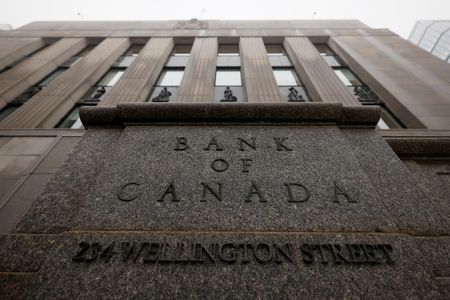By Shashwat Chauhan and Sukriti Gupta
(Reuters) -Wall Street’s main indexes fell on Wednesday, as a hotter-than-anticipated inflation reading added to worries that the Federal Reserve would not cut interest rates anytime soon, while some upbeat earnings like that of CVS Health helped crimp losses.
U.S. consumer prices increased by the most in nearly one-and-a-half years in January, reinforcing the Fed’s message that it was in no rush to resume cutting interest rates amid growing uncertainty over the economy.
The surge in prices offered a cautionary note to President Donald Trump’s push for tariffs on imported goods, which have been panned by economists as inflationary.
“The CPI report was not a disaster but it’s not what the Fed wanted to see either,” said Robert Ruggirello, chief investment officer, at Brave Eagle Wealth Management.
“I think (the Fed) is going to do what’s implied by the market.”
Traders are now fully pricing in just one more 25 basis point rate reduction this year.
Before the data, they saw an about 40% chance of another similar-sized move, as per LSEG data.
Fed Chair Jerome Powell also began his second day of testimony before Congress on Wednesday. He had reiterated that the U.S. central bank is in no rush to cut its short-term interest rate again when he testified to the Senate Banking Committee on Tuesday.
January’s reading is the last inflation reading before any direct impact from Trump’s tariff measures, which went into effect this month.
Trump’s trade advisers are finalizing plans for the reciprocal tariffs on every country that charges duties on U.S. imports.
The Cboe Volatility Index, known as Wall Street’s “fear gauge,” jumped to its highest in a week, last at 16.6 points.
Most megacap and growth stocks fell, with Nvidia and Amazon.com sliding over 1% each.
Tesla was an outlier, up 2.7% after falling for the last five sessions.
At 11:26 a.m. ET, the Dow Jones Industrial Average fell 441.36 points, or 0.99%, to 44,150.93, the S&P 500 lost 46.71 points, or 0.77%, to 6,021.21 and the Nasdaq Composite lost 114.85 points, or 0.58%, to 19,531.10.
The economically sensitive Russell 2000 smallcap index dropped 1.4%.
All 11 S&P 500 sectors traded lower, with rate-sensitive real estate leading losses, down 1.4%.
The utilities sector, often traded as a bond proxy, owing to its stable income regardless of the economic situation, also slid 0.7%.
Treasury yields shot up after the inflation data, with the one on the 10-year note hitting its highest in over two weeks.
CVS Health advanced 13.6% after the healthcare conglomerate beat fourth-quarter profit estimates.
Gilead Sciences jumped 7.7% as the biotech company forecast 2025 earnings above analyst estimates.
Lyft dropped 6.6% after the ride-hailing company forecast current-quarter gross bookings below estimates.
Declining issues outnumbered advancers by a 3.82-to-1 ratio on the NYSE and by a 2.29-to-1 ratio on the Nasdaq.
The S&P 500 posted 11 new 52-week highs and 22 new lows, while the Nasdaq Composite recorded 41 new highs and 182 new lows.
(Reporting by Shashwat Chauhan and Sukriti Gupta in Bengaluru; Editing by Maju Samuel)











